|
Oral Health
Less than half of all 2 and 3-year olds in California (even fewer from low-income families) have ever seen a dentist, as recommended. Check out our
WIC Can Help
page to learn more about
WIC's critical role
in promoting oral health for all families and referral resources like
Denti-Cal
. It was great to see the Denti-Cal program in CWA's 2018 Trade Show!
|
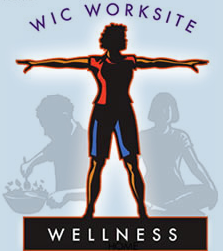
Happiness in the Workplace
Given how much of our time we spend at work, it is important for our physical and mental health to find a healthy, rewarding environment.
Here are some steps you can take to make the most out of your current situation.
|
Shopping at Amazon?
Support CWA without spending anything extra by using
AmazonSmile!
|
Did someone share this with you? Sign up here to get the CWA Flash directly!
|
|
|
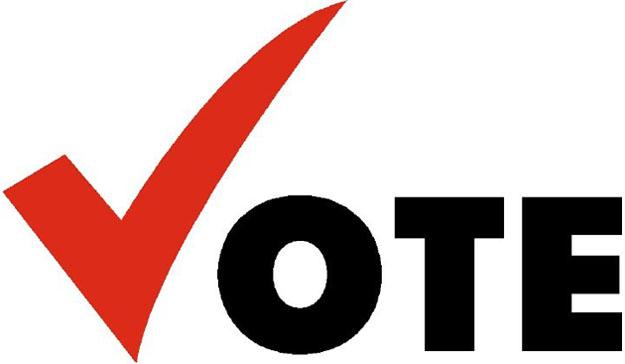
|

WIC Funding - Senate Update
The Senate agriculture appropriations has proposed $6.15 billion for WIC fiscal year 2019 funding, (page 83), including $60 million for breastfeeding peer counselors and a $400 million rescission. This is in comparison to the House proposal of $6 billion program funding, $60 million for breastfeeding peer counselors and a $300 million rescission. In fiscal year 2018, funding for WIC was $6.175 billion. NWA has been and will continue to advocate for $6.3 billion and $90 million for breastfeeding peer counseling. The $60 million funding level for breastfeeding peer counselors is in reality a cut, as funding has not increased for several years. It also does not allow for expansion of this successful strategy. Included in the Senate version is $5 million for grants to explore telehealth. Next steps will be an expected Senate floor vote, perhaps in the next month, with a date for a House vote on agricultural appropriations not yet identified and then conferencing and agreement on a final budget proposal. ACTION: Use NWA's easy action tool to contact the Senate Subcommittee on Agriculture Appropriations to ask them to fully fund WIC at $6.3 billion, with $90 million for the breastfeeding peer counselor program!
|

Public Charge - Stay Informed and Take Action!
Nothing has changed, but if anything changes, and new rules are proposed, it is expected that they will be released in July by Dept. of Homeland Security. Currently the Office of Management and Budget (OMB) is taking meetings on the impact of the proposed changes, NWA having met with OMB in early May. You should stay informed and you and your organization can take some action. ACTIONS: Read the NWA FAQs, available in English, Spanish and Chinese. Join the Protecting Immigrant Families, Advancing Our Future Campaign. Have your organization sign the statement opposing the proposed changes in public charge. Sign-on is being collected now in anticipation of release of proposed rule changes. Check out and thank the members of Congress, including many California representatives, for their letter opposing the punitive proposed changes.
|
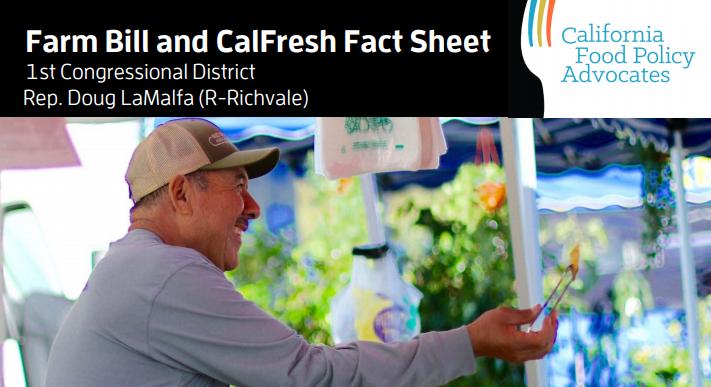
Farm Bill Anticipated, House Bill Fate Uncertain
Our colleagues at NWA report that Chairman Roberts (R-KS) has indicated that a markup of the Senate Farm Bill could come as soon as tomorrow, with a full committee vote potentially following next Wednesday. The Senate bill is highly anticipated as a bipartisan alternative to the House Farm Bill proposal, which failed its first floor vote. The controversial House bill may receive a second vote between now and June 22 due to a procedural maneuver, but it is unclear whether Republican leadership will be able to secure enough support for the bill to pass at that time. The House Freedom Caucus had originally tried to use the Farm Bill as a bargaining chip to bring a vote on some conservative immigration proposals, but the caucus has now indicated that they would still not necessarily support the House bill, even after an immigration vote is allowed. NWA will continue to monitor the Farm Bill and provide updates to members.
|

CA Breast Pumps Rates Increase: CALL NOW!
CWA is sponsoring a proposal in the State Budget to seek a long overdue rate increase for quality breast pumps in the Medi-Cal Program. There has not been an increase for this durable medical equipment product in over 30 years! The Senate Budget Subcommittee voted to adopt $4 million for this proposal, but the Assembly did not include funding for this proposal in its budget. The item will now be discussed in Budget Conference hearings between the Senate and Assembly - this is expected to happen as soon as this Thursday! Phone calls are needed to get this proposal funded in the final budget agreement. ACTION: Keep those phone calls coming! See contact information for key legislators here, as well as background information and our bill monitor list.
|

Request Free Farm2WIC Resources Now!
Farmers' Market season is well under way throughout California. If your local market is authorized to accept both Fruit and Vegetable checks (FVC, aka CVV) and FMNP checks, please make sure they know CWA has colorful Farm2WIC postcards and signs for them to use. Local WIC agencies can also get fact sheets for staff and flyers for participants. All materials are free, but only while supplies last!
ACTION:
View materials here and request them by June 15 by emailing Meghan or calling 916-572-0700. Markets interested in getting authorized should contact the State WIC Farmers' Market Team, 916-928-8513 or [email protected].
|
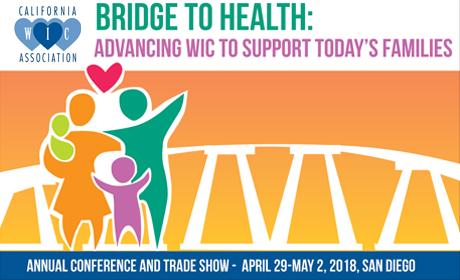
Conference Materials: Access Through June
Were you inspired by a great workshop presentation at our 2018 Annual Conference? Or wish you could have been there? Thanks to the generosity of our speakers, you can download presentation materials from plenary and concurrent workshops from our website for your own reference or to share with colleagues. There's a catch, though: they will only be available through June 30!
ACTION
: View or download the PDF files here. Contact a speaker directly if you need more information.
|
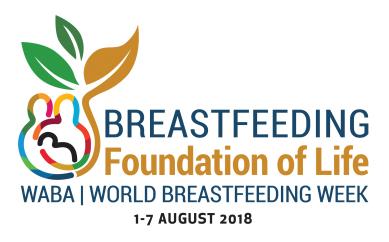
California's 2018 World Breastfeeding Week Campaign
Be a part of the
activities to help raise awareness
about lactation accommodation. You will be provided Facebook and Twitter posts to promote lactation accommodation, an infographic on workplace breastfeeding support in California that highlights improvements and addresses current ethnic disparities, fact sheets for employers and employees, and a webinar to build your social media skills to use these materials. Sponsored by CA Dept. of Public Health, CA Breastfeeding Committee and CWA. ACTION:
Register
for the webinar, July 9, 12-1:30pm on promoting lactation accommodation in the workplace using Twitter, a platform that has tremendous reach, but is often underutilized. To best address your needs in the webinar, please complete this
survey
by June 13, so we can target the information.
|

Sunscreens - Many Questions
A few concerning issues are coming to light regarding sunscreens. Compared to other countries, US manufacturers are behind in including new and more effective ingredients, especially those that block the more dangerous UVA rays. Sunscreens are also being implicated in harmful environmental impacts. The FDA just
released guidance
on conducting research of over-the-counter topical medicines and their potential effect on key populations such as infants or breastfeeding women. And environmental impacts of sunscreens are starting to be addressed. Hawaii
may ban the sale
of over-the-counter sunscreens containing two ingredients that harm coral reefs.
|

Babies Prefer to Hear From Other Babies
Before infants start to "babble," they can recognize vowel-like sounds, and
show a strong preference
for listening to these sounds when they come from other babies vs. adults. Infants spent 40 percent longer listening to sounds from babies than adult vocalizations of the same vowels. Researchers note that access to infant speech, likely including a baby's own vocalizations, seems to have a broad and significant impact, influencing receptive, expressive and motivational aspects of speech development. Parents should still talk to their babies and imitate their babble - babies are responsive to that as well, but exposure to infant vocalizations may motivate infants to be vocally active and make it easier to evaluate their own vocalizations, perhaps energizing and supporting spoken language development.
|

Prenatal Marijuana Use May Impact Birth Weight, Child Behavior
Researchers have found that prenatal marijuana use can
have consequences on infants' weight as well as influence behavior problems
, especially when combined with tobacco use - and nearly 30 percent of women who smoke cigarettes during pregnancy also report using marijuana. In a study of nearly 250 infants and their mothers, infants exposed in utero to both tobacco and marijuana, especially into the third trimester, were smaller in length, weight and head size, and more likely to be born earlier compared to babies not exposed to anything. They also were more likely to be smaller in length and weight compared to babies exposed only to tobacco in the third trimester. Results were stronger for boys compared to girls. Smaller babies were also reported by mothers to be more irritable and more easily frustrated and had greater difficulty calming themselves. Women reporting stress in pregnancy were more likely to continue using tobacco and marijuana throughout pregnancy. Researchers suggest that interventions with women who use tobacco or marijuana while pregnant should also focus on reducing stress and helping them cope with negative emotions.
|

Mercury From Fish Not a Cause of Autism
Scientists who examined data from nearly 4,500 women who took part in the Children of the 90s study say that
there is no evidence to indicate
that mercury from fish consumption is a cause of autism. Using blood samples, reported fish consumption and information on autism and autistic traits, researchers found no links between levels of mercury in the mothers and autism or autistic traits in their children. The only adverse effect of mercury found was poor social cognition if mothers ate no fish at all, especially for girls. Researchers say that findings further endorse the safety and benefits of eating fish during pregnancy.
|
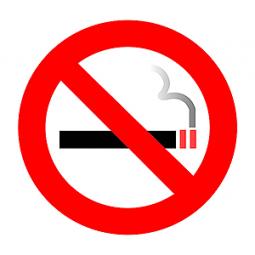
Smoking Cessation Services for Parents of Young Children Webinar
The
California Smokers' Helpline
and its training and technical assistance arm, the
Center for Tobacco Cessation
, will host a free webinar on Wednesday, June 13th from noon to 12:30 pm PST, Special Services for Special People. Pregnant women and parents of young children are very important people with a big responsibility-keeping their children safe and healthy. The California Smokers' Helpline offers free help to quit smoking to any resident of California, including special services just for pregnant women. With funding from First 5 California, the Helpline also offers free nicotine patches to qualified callers who are pregnant or have children ages 0 to 5. Sharon Cummins, PhD, Director of Research and Evaluation for the California Smokers' Helpline, will discuss the importance of helping pregnant women and parents of young children quit smoking. She will also talk about the Helpline's free resources for First 5 audiences including our evidence-based telephone counseling, specialized counseling protocol for pregnant women, nicotine patches, and patient materials for health professionals. ACTION:
Register here
!
|
Study on Impact of Skin-to-Skin After Cesarean Birth
The Association of Women's Health, Obstetric, and Neonatal Nurses has published "
Retrospective Chart Review of Skin-to-Skin Contact in the Operating Room and Administration of Analgesic and Anxiolytic Medication to Women After Cesarean Birth
" in the journal Nursing for Women's Health. This retrospective study analyzed the association between skin-to-skin contact in the operating room and administration of analgesics and anxiolytics to women in the operating and recovery rooms after cesarean birth. Results indicated a trend toward decreased medication administration for women who experienced skin-to-skin contact and add to evidence supporting the incorporation of skin-to-skin contact in the operating room as the standard of care for cesarean birth. This practice has the potential to enhance the birth experience, promote breastfeeding, and provide greater safety with less exposure to opioids and benzodiazepines for women and their newborns.
|
|
|